"Are they not guided by the many generations We have destroyed before them among whose dwelling places they walk about? There are Signs in that for people of sound intellect." .(Qur'an 20: 128)
Buddhism's Erroneous Beliefs

The erroneous beliefs of Buddhism vary greatly from country to country, because over the past 2500 years, this religion has mingled with the various local religions, customs, and established cultures of countries into which it has spread. Today, the varieties of Buddhism practiced in Japan, China, Tibet, Sri Lanka, Vietnam and America are all quite different from one another.
As historical sources show, Buddha always chose to speak about his basic tenets and deliver his way of worship orally; centuries of research has determined that he left behind no written texts. Buddhists maintain that his sermons were passed down orally from generation to generation for 400 years, until they were finally compiled in the Pali canon. However, most scholars believe that the great majority of these words are not Buddha's at all, but were added to in the course of centuries until they attained their present form. Therefore Buddhism, not relying on any written texts, underwent many changes and distortions over the course of time, being considerably reshaped by additions and omissions.

In Tibet, the dissemination of Buddhist texts is one of the most important acts of worship. In particular, priests who have removed themselves from the world completely give themselves solely to this work. With no idea of the true nature of the afterlife, these people live out their worldly lives in vain pursuits.
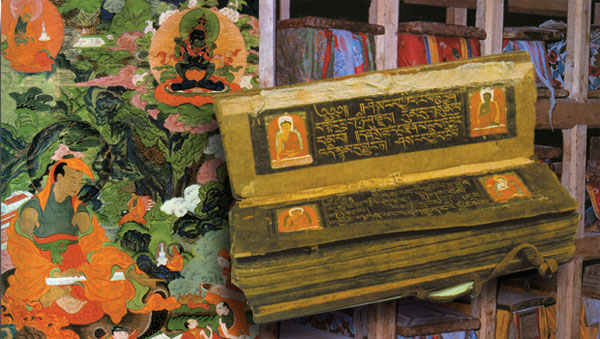
Throughout the centuries, libraries in Tibet have been destroyed. But handwritten books by Tibetan priests are still preserved in neighboring regions. All this Buddhist literature leads people to lead a nightmarish life. This perverse and benighted religion claims that after they die, people might come back as a cow or a mouse and condemns them to lives of fear and anxiety.

Priests who translate texts from ancient languages are important in Buddhism. In the photograph on the facing page, Buddha watches and encourages priests doing this work. Below: A Sanskrit text from the 11th century contains sections on the life of Buddha. Those espousing the perverse beliefs in these texts have serious moral and psychological deficiencies, since they lack any faith in the eternal afterlife. It is quite natural that Buddhists have these spiritual problems because they believe that they may reincarnate as a mouse, monkey, cow or some other animal.
Today, Buddhism's holy book, written in the Pali language, is called the Tipitaka, which means "triple basket." It is not known for sure when the Tipitaka was written down, but it is thought to have attained its present shape in Sri Lanka sometime in the first century B.C. Its texts are divided into the following chapters:
- Vinaya Pitaka: This chapter, meaning "Basket of Discipline," contains rules relevant to priests and nuns and how they should be followed. There are also some matters of relevance to those lay readers who are not priests or nuns.
- Sutta Pitaka: Most of this volume is composed of talks in which Buddha explained his ideas. For this reason, this chapter is called the "Basket of Discourse." These words of his were passed down through the centuries, becoming mixed with other legends and false beliefs.
- Abhidhamma Pitaka: This volume contains Buddhist philosophy and interpretations of Buddha's sermons.
Today's Buddhist priests regard these texts as holy; they worship and organize their lives according to them. They portray Buddha as an actual god (God is surely beyond that!), and for this reason, modern Buddhists bow before his statues, place before them offerings of food and flowers, and expect help from them. This is a completely illogical practice, however, and anyone who believes that stone or bronze statues can hear or help is greatly deceived. Later in this book, we examine these basically pagan practices in more detail, and see how Buddhism has become a secret doctrine concentrating on human beings without accounting for questions of how this world's flawless systems function, much less how the entire universe came to be.
An Atheistic Religion
Buddhist philosophy denies the existence of God, but bases itself on a few aspects of human morality and on escaping from sufferings of this world. Without any intellectual or scientific support, it rests upon the twin concepts of karma and reincarnation—the idea that human beings are continually reborn into this world, that their subsequent lives are shaped by their behavior in their previous ones. No Buddhist scripture considers the existence of a Creator, much less how the universe, the world and living things came to be. No Buddhist text describes how the universe was created from nothing; or how living things came into being; or how to explain the evidence, to be seen everywhere in this world, of an incomparable creation. According to the Buddhist deception, it is not even necessary to think about these things! The only important thing in life, Buddhist texts claim, is suppressing desires, revering Buddha, and escaping from suffering.
As a religion, therefore, Buddhism suffers from a very narrow vision that keeps its believers from considering such basic questions as where they came from, or how the universe and all living things came to be. Indeed, it deters them from even thinking about these things and presses them into the narrow mold of their present earthly life.
"Do they have legs they can walk with? Do they have hands they can grasp with? Do they have eyes they can see with? Do they have ears they can hear with?" (Qur'an 7: 195)
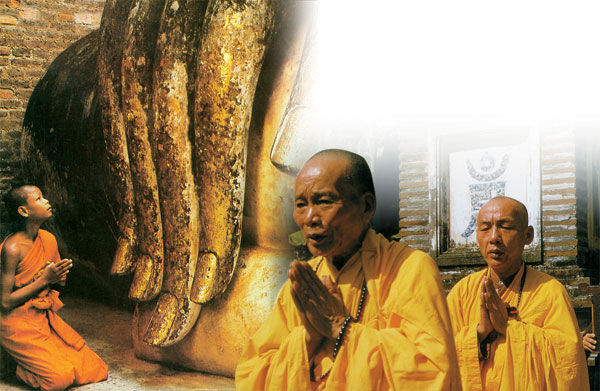
Buddhism is a false religion founded on idolatry. Buddhist priests who grow up with these beliefs spend their lives worshipping Buddha .
An Oppressive, Enslaving Religion

According to Buddhism, hunger, misery and pain guide the way to the truth.
Buddhism's attempt to nullify all human desires is another aspect of its narrow philosophy. God created the blessings of this world for human beings' benefit and pleasure, and so that they would give Him thanks in return. For this reason, Islam does not command people to suppress their desires or to endure pain and suffering. On the contrary, it enjoins them to take advantage of the beautiful aspects in the world (apart from base and unlawful behavior), not to restrain themselves needlessly, nor to inflict pain upon themselves. For this reason, God revealed (Qur'an, 7: 157) that the Prophet Muhammad (peace be upon him) had "relieved his followers of their chains":
Those who follow the Messenger, the Ummi, whom they find written down with them in the Torah and the Gospel, commanding them to do right and forbidding them to do wrong, making good things lawful for them and bad things unlawful for them, relieving them of their heavy loads and the chains which were around them. Those who believe in him and honor him and help him, and follow the Light that has been sent down with him, they are the ones who are successful.
In short, Islam is a liberating religion that saves people from useless customs and prohibitions, social pressures and worries about what other people may think. It calls them to lead calm, peaceful lives with the purpose of gaining God's approval. So it is that our Prophet (may God bless him and grant him peace), in many of his sayings, advises us to make religion simple and easy.
Present-day Buddhists believe that the more pain they endure, and the more hunger and misery they suffer, the sooner they become enlightened. But this is not enlightenment; it is an inhuman life of self-abuse. A verse of the Qur'an (40:31) says,"God does not want any injustice for His servants." This perverse practice of Buddhists is totally contrary to Islamic morality.
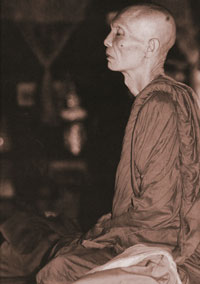
"Make things easy for the people, and do not make it difficult for them, and make them calm (with glad tidings) and do not repulse (them)."1
"You have been sent to make things easy (for the people) and you have not been sent to make things difficult for them."2
Buddhism enslaves its devotees in misty monasteries and forces them into a life of suffering and poverty. Strangely, it discourages good food, cleanliness, comfort—the blessings that God has created for human beings—accepts suffering as a virtue and advises its devotees to lead a miserable life.
For Buddhist monks and nuns, life is full of all kinds of difficulties. They are forbidden to work or own property, obliged to feed themselves by going from door to door and begging among the people, with their bowls in their hands. For this reason, Buddhist priests are even called bhikkhus (beggars) by the people. Buddhist priests are forbidden to marry or have any kind of family life; they may own only one robe, which must be of poor quality yellow or red cloth.
Besides this robe, their only other possessions include a hard bed to sleep on, a razor to shave their heads with, a needle case for their own use, a water bottle and a bowl to beg with. They eat only one meal a day, generally consisting of bread and rice flavored with spices, and drink either water or rice milk. They must finish this food before noon and are not allowed to eat anything until the next day. Other foods, even medicines, are regarded as forbidden luxuries. A priest may eat meat, fish or vegetables only if he is sick and then, only with the permission of a higher-ranking priest. In short, Buddhist strictures are a form of self-torture.
This situation is a manifestation of the truth of the verse in the Qur'an (10: 44) that reads, "God does not wrong people in any way; rather it is people who wrong themselves." But to those who believe in Him and submit themselves to Him, God promises a very good life, both in this world and the world to come. To them belong both the blessings of this world and those of the afterlife. According to the Qur'an (7: 32):
Say: "Who has forbidden the fine clothing God has produced for His servants and the good kinds of provision?"
Say: "On the Day of Rising, such things will be exclusively for those who believed during their life in this world." In this way, We make the Signs clear for people who know.
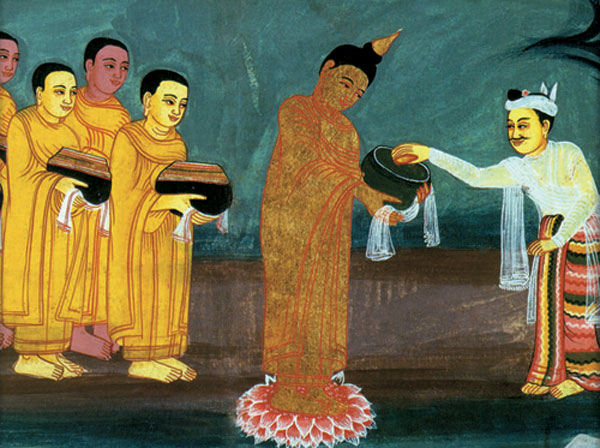
This picture shows Buddha and his followers, bowls in their hands, accepting offerings. These irrational Buddhist traditions continue today. Those who fall into Buddhist perversity, are obliged to beg, even though they have no need, and be humiliated. Instead of working for a living, Buddhism leads people into laziness and indolence, condemning them to primitive living conditions. But Islam enjoins exactly the opposite—a vigorous religion that makes its believers dynamic and directs them to do useful work. In contrast to the dark atmosphere of Buddhism, Islam enjoins cleanliness, courtesy, and fruitful labor and encourages the development of science and technology.
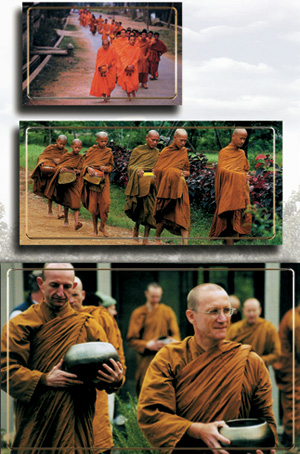
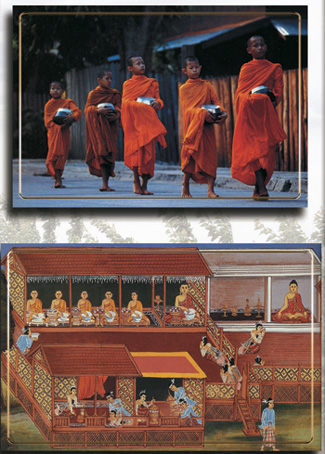
Those who are not priests nevertheless assist priests in the collection of offerings, believing that they will gain merits for a future life. Buddhist priests walk the streets early in the mornings, with bowls in their hands, accepting offerings from the people. Butthis superstitious practice, done in the name of worship will do them no good in this world or the next, unless God wills otherwise.


Buddhists spend their days performing empty, soul-darkening works that will bring no benefit in either this world or the afterlife. But Islam offers people wellbeing, beauty and contentment in this life and the next, and forbids any kind of practice that goes

A Buddhist priest set himself on fire to protest some actions by the government in Saigon. This one photograph is enough to show the dark spiritual state and perverse understanding that Buddhism leads to.
Another dark aspect of Buddhism is its pessimism. The "nirvana" it promises to its believers is nothing less than a schizophrenic breaking of all connections with life by a melancholic mind that takes a dim view of the world. The Catholic Encyclopedia describes this aspect of Buddhism in these words:
Another fatal defect of Buddhism is its false pessimism. A strong and healthy mind revolts against the morbid view that life is not worth living, that every form of conscious existence is an evil. Buddhism stands condemned by the voice of nature the dominant tone of which is hope and joy. It is a protest against nature for possessing the perfection of rational life. The highest ambition of Buddhism is to destroy that perfection by bringing all living beings to the unconscious repose of Nirvana. Buddhism is thus guilty of a capital crime against nature, and in consequence does injustice to the individual. All legitimate desires must be repressed. Innocent recreations are condemned. The cultivation of music is forbidden. Researches in natural science are discountenanced. The development of the mind is limited to the memorizing of Buddhist texts and the study of Buddhist metaphysics, only a minimum of which is of any value. The Buddhist ideal on earth is a state of passive indifference to everything.3
Islam does not make its adherents indifferent; on the contrary, it calls them to liveliness, activity, and joy. All those who adopt the teachings of Islam are very sensitive to what goes on around them. They do not regard the world as Buddhism does, as chaos to avert the eyes from, but as a testing place—an arena in which they can put the high moral teachings of the Qur'an into practice. For this reason, Islamic history is full of just and successful leaders who ensured comfortable and happy lives for their people. In sharp contrast, Buddhism produces only wretched adherents who cause themselves suffering, drag themselves and others into passivity and poverty, and whose only solution to the problems they encounter is to immolate themselves. This is one of the biggest games that Satan plays with people.
A Pagan Religion
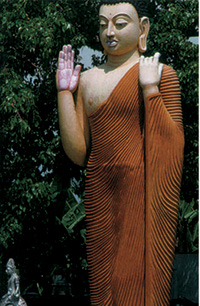
Buddhism is a pagan religion, inasmuch as it worships idols. It is said that today's Buddhism has been divided into different schools, and that worship of Buddha characterizes only some of them. But even to accept Buddhism as an infallible guide—an error that all schools of Buddhism fall into—is an indication that this religion views Buddha as a god.
According to historical sources, Buddhist priests began to deify Buddha shortly after his death. Statues of him were erected everywhere, and the perverse belief gained strength that Nirvana had actually taken shape in his body and was embodied in these statues. The excessive respect that Buddhist priests paid to Buddha later turned into outright worship. Today, giant statues of him adorn every country where Buddhism is the dominant religion. In many countries from Asia to America, you can see statues and temples with Buddha's eyes painted on them—again, suggesting the message that Buddha sees everything and watches people constantly, and that they should be thinking of him every minute of their lives. Clearly, it's a completely untenable belief that someone who died thousands of years ago can still see those who believe in him, protect them, and listen to their prayers. The basic truth that Buddhists are unable to grasp is that God, Lord of all the Worlds, Who encompasses everything and knows the deepest hidden secrets of all things, created Buddha, like all human beings.
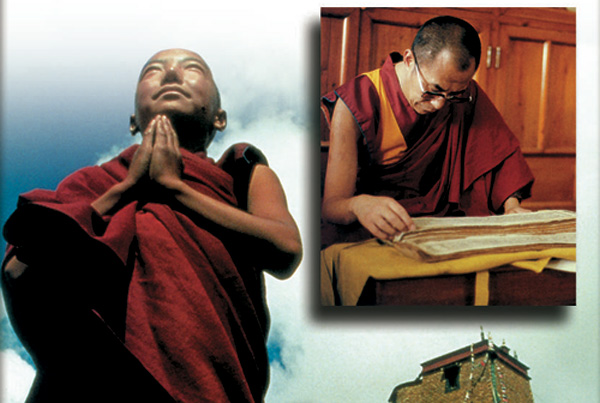
Left: The eyes painted on some temples represent Buddha's eyes, which supposedly see everything. This kind of temple, statues of Buddha and painted eyes are frequently seen in countries where Buddhism has been widely accepted, clearly showing how Buddhism has made Buddha into an idol.
Right: Samye monastery is one of Tibet's most famous temples, where Buddhists spin their prayer cylinders and say their prayers. Ceremonies performed by the priests sometime last all day. But Buddhists ignore the fact that Buddha will not hear them or answer their prayers. Like all human beings, Gautama was a powerless servant whom God created; only God can answer prayers:
"The call of truth is made to Him alone. Those they call upon apart from Him do not respond to them at all. It is like someone stretching out his cupped hands towards water to convey it to his mouth: it will never get there. The call of the unbelievers only goes astray." (Qur'an, 13: 14)
"If you associate others with God, your actions will come to nothing and you will be among the losers." (Qur'an 39: 65)

Belief in Karma
The doctrine of karma supposes that everything a person does will have its effect on him sooner or later, and will have a bearing on his so-called next incarnation. According to this belief, people are continually reborn into this world, where they must bear the consequences in that later life of what they did in a former one. Buddhism denies the existence of God and believes that karma is the unique power that governs everything.
Karma is a Sanskrit word that means "act," and refers to the law of cause and effect. According to those who believe in it, a person will experience in the future what he has done in the past, for good or ill. The past is one's former life; the future is supposed to be a new life they will begin after death. According to this belief, anyone who is poor in this life is paying with his poverty the price for evil that he committed in some former life. This superstitious belief also claims that in a later life, an evil person may be "demoted" to rebirth as an animal or even a plant.

According to the theory of karma, those who are poor, handicapped or ill are paying the price for evil deeds committed in a previous life. Therefore, they deserve their present misfortunes. This perverse understanding results in prevalent injustices in societies where belief in karma is widespread.
One harmful result of believing in karma is that it teaches that present helplessness, poverty and weakness are punishments for a person's moral evils. According to this belief system, if a person is disabled, it's because he has inflicted a similar injury on someone else in a former life and therefore deserves it. This superstitious belief is the main reason why the unjust social structure of the caste system dominated India for so many centuries. (It must be remembered that karma is a Hindu idea, and Buddhism actually arose from Hinduism.) Because the caste system was based on karma, the poor, sick and disabled within India were despised and oppressed. The wealthy high-caste ruling class regarded their own privileges as natural and just.
In Islam, however, being weak is not a retribution; it is accepted as a test from God. Furthermore, other people have the very important duty of helping those who are in need. For this reason, Islam—like Judaism and Christianity, other religions based on divine revelation but that were later altered—has a very strong sense of social justice. But karma-based religions like Buddhism and Hinduism tolerate inequality and pose a great obstacle to social progress.
Karma is based on the belief in reincarnation: the idea that people come back into the world with the same spirit but in a different body. This idea of a "wheel of rebirth" supposes that every life influences a subsequent one. But this belief fails with one single question: how does this karma operate? If Buddhism doesn't accept the existence of God, then who judges a person's former life and sends him back into the world in a new body? This question has no answer! Buddhists believe that karma is a "natural law" that functions by itself, spontaneously, like gravity or thermodynamics. However, it is God Who created all natural laws. No natural law observes what people do throughout their lives, keeps an account, and judges them after death on that basis. No natural law determines, as a result of this judgment, what kind of new life a person will have and re-creates him accordingly; and no natural law imposes this process flawlessly on billions of people, much less animals. Clearly no such natural law exists, and so, neither can such a process exist.
So many people throughout the world believe in reincarnation, even though it has no logical basis, because they have no religious faith. Denying the existence of an infinite afterlife, they fear death and cling to the idea of reincarnation as a way to escape their fear. Belief in reincarnation—like belief in karma—is based in the false consolation that death is nothing to be feared, and that anyone will be able to attain his goals in a new birth.
If reincarnation can't occur on its own, as a natural law, then clearly it could exist only through a supernatural act of creation. But a look at the Qur'an tells us that reincarnation is a myth. The Book that God sent down as a guide to humanity openly declares that reincarnation is false.
Reincarnation According to Islam
"Those who call on anything other than God are not really following their partner- gods. They are only following conjecture." (Qur'an 10: 66)
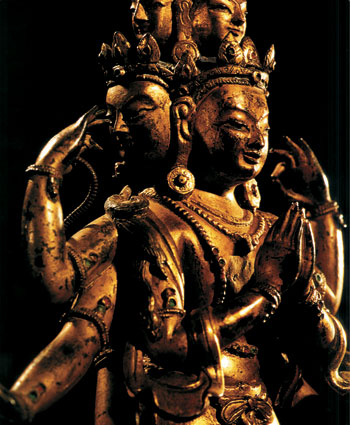
As in every other matter, the Muslim point of view regarding to the philosophy of karma must be based on what God says in the Qur'an, which states there is only one birth and resurrection. Everyone lives only once on this earth, and then he dies. In verse 62: 8, our Lord gives the following command:
Death, from which you are fleeing, will certainly catch up with you. Then you will be returned to the Knower of the Unseen and the Visible and He will inform you about what you did.
A person is resurrected after death and, according to all the things he has done and the works he has performed, is rewarded with either eternal Paradise or endless Hell. That is to say, that a human being has one life in this world, and then an everlasting afterlife. God says very clearly in the Qur'an (21: 95) that after he has died, no one will return to this life: "It is ordained that no nation We have destroyed shall ever rise again." And similarly:
When death comes to one of them, he says, "My Lord, send me back again so that perhaps I may act rightly regarding the things I failed to do!" No indeed! It is just words he utters. Behind them is a barrier until the Day they are resurrected. (Qur'an, 23: 99-100)
As these verses show, one part of humanity will die in the hopes of being reborn, but at the moment of their death, it will be revealed to them that this is absolutely impossible. In another verse in the Qur'an (2: 28), God says this about the death and resurrection of human beings:
How can you reject God, when you were dead and then He gave you life, then He will make you die and then give you life again, then you will be returned to Him?
God says that every human being is dead to begin with; that is, he is created out of the basic inanimate elements of soil, water and mud. Then, God "formed and proportioned" this lifeless mass (Qur'an, 82: 7) and brought him to life. At a specific time after the individual has been brought to life, life comes to an end, and he dies. He returns to the earth and decays back into the soil, where he awaits the final resurrection. Everyone will be resurrected on the Last Day when, learning that another return to earth is not possible, he will give an account of all the actions he did in his life. In the Qur'an (44: 56-57), God says that after a human being has come into this world, he will experience only one death: "They will not taste any death there—except for the first one. He will safeguard them from the punishment of the Blazing Fire. A favor from your Lord. That is the Great Victory."
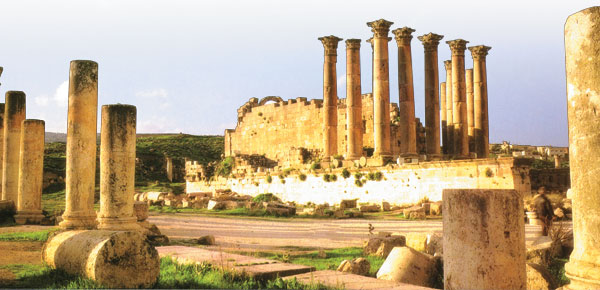
"How many generations We have destroyed before them! Do you see a trace of any one of them or hear even a whisper of them?"
(Qur'an 19: 98)
These verses make it clear that death occurs only once. No matter how much people want to overcome their fears of death and an everlasting afterlife and console themselves with false beliefs in karma and reincarnation, the reality is that they won't return to this world after they die. Everyone will die only once and, as God has willed, will have an endless life in the world to come. According to the good or the evil that individuals have done, they will either be rewarded with Paradise, or punished with Hell.
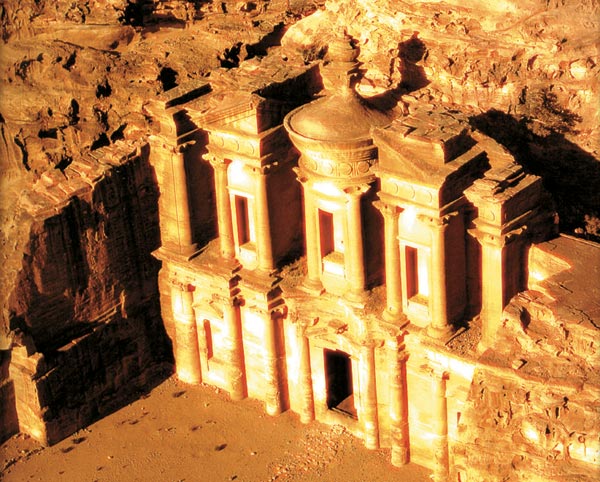
The remains of Petra in Jordan
Eternally just, merciful and compassionate, God gives the perfect reward for what everyone has done. If a person seeks comfort in false beliefs because he fears death or the possibility of going to Hell, he will experience certain ruin. Anyone who has intelligent awareness, conscience, and fears in this regard must turn to God with a sincere heart if he hopes to escape the pains of Hell and attain Paradise. He must conform his life to the Qur'an, the true guide for humanity.
Never yet has being old or young, beautiful or rich been able to prevent anyone from dying; and so, no one can disregard death's reality. Whether people disregard that reality or not, it is something they can never avoid.
The throes of death come revealing the truth. That is what you were trying to evade! (Qur'an, 50: 19)

The remains of Petra in Jordan
Reading these lines, you may be led to consider the closeness of death. Perhaps death is closer to you than to others; and you may die before you finish reading this book. It may come for no apparent reason, with no illness, accident or age-related cause. God will send the Angel of Death to come at the hour of your departure and take your soul.
We must always keep this important fact in mind and never postpone making preparations for death. The Qur'an (63: 11) reminds us that "God will not give anyone more time, once their time has come." Here, God tells us that death cannot be postponed, and He speaks of the sorrow of an individual who meets it:
Give from what We have provided for you before death comes to one of you and he says, "My Lord, if only you would give me a little more time so that I would give charity and be among the righteous!" God will not give anyone more time, once their time has come. God is aware of what you do. (Qur'an, 63:10-11)

Buddhism's Misguided Belief About the Afterlife

According to superstitious Buddhist beliefs, the existence of the universe, human beings, death and rebirth are all uncontrolled processes. Those who believe in this irrational claim are spiritually unbalanced. They live in tension and discomfort that comes from the frightening idea that everything in the world is arbitrary. But Islam teaches that God controls everything that happens in the universe. Those who understand this trust God at every moment, living in the joyous comfort of His support and protection.
Buddhism's belief in karma leaves no room for belief in the eternal afterlife, Paradise or Hell. This false and perverse position —the idea that an individual returns into the world after each death, continually—conflicts with what God has revealed in the Qur'an. In The Religions of India, Edward Washburn Hopkins, a professor of Sanskrit and Comparative Philology, explains that Buddhism does not believe in an afterlife:
. . . The logic of his own system led Buddha into a formal and complete pessimism, which denies an after-life to the man that finds no happiness in this . . .In his talks with his questioners and disciples, he uses all means to evade direct inquiry in regard to the fate of man after death. He believed that Nirvana (extinction of lust) led to cessation of being; he did not believe in an immortal soul... What he urged repeatedly was that every one accepting the undisputed doctrine of karma or re-birth in its full extent (i.e., that for every sin here, punishment followed in the next existence), should endeavor to escape, if possible, from such an endless course of painful re-births. . .4
From some Buddhist writings, one can glean the following information on the afterlife:
Whether one is reborn in Heaven or in one of the various levels of Hell, the forms of existence in these places are transitory, as they are on earth, and are not eternal. As in Hinduism, the period of time during which . . . individuals remain in these places depends on the amount of good and evil they have done while on earth. When the prescribed time has been completed, they will return to earth again. Heaven and Hell are no more than temporary states of existence in which the individuals receive their reward for the acts they have committed while on earth.5
Buddhism teaches that there is a kind of Paradise and Hell, as a reward and punishment for what a person has done. But because this belief does not stem from a revealed religion, it contains many contradictions and illogicalities. Above all, and contrary to what God has revealed in the Qur'an, Buddhism believes that Paradise and Hell are only transitory.
Again, one of this belief's most illogical aspects is the idea that all systems in the world operate, in effect, by themselves. According to Buddhism, just as the existence of the universe and human beings is uncontrolled, so is the cycle of death and re-birth. There is no room in this belief for a Creator Who has brought into existence the world and the life upon it, together with Paradise and Hell, and rewards human beings for what they have done. However, accepting the existence of Paradise and Hell as places where reward and punishment are given, but not explaining how these realms were created, is an extremely illogical, unacceptable claim.
But who deals out the rewards and punishments? Moreover, how were these realms created? The philosophy of karma claims no account of how Paradise and Hell could have come into being without a Creator. This superstitious belief has been passed down from generation to generation, without ever being questioned or logically explained. Buddhism has no logical explanation for the existence of the universe or how it functions, nor of the origin of the flawless creative art evident in all living things. For this reason, Buddhism can never presume to be more than a mystical movement with no basis in logic, supported only by myths.
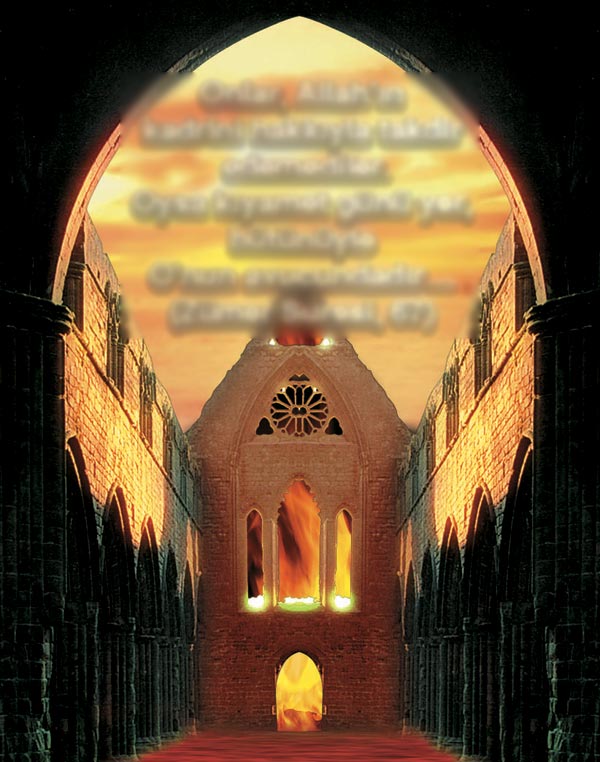
The Reality Awaiting Us in the Hereafter
The only source where we can learn the facts about life in this world and belief in the afterlife is the Qur'an, sent down as a guide for human beings and the teachings (Sunnah) of the Prophet (may God bless him and grant him peace).
God says in the Qur'an that life in this world is a temporary testing period for everyone, and that the afterlife is our eternal homeland. Everyone will have a reward in Paradise or Hell for all the deeds he has done over the lifetime he has spent in this world. God reveals this truth in these words (Qur'an, 6: 32):
The life of this world is nothing but a game and a diversion. The hereafter is better for those who do their duty. So will you not use your intellect?

"The life of this word is nothing but a game and a diversion. The abode of the hereafter-that is truly Life." (Qur'an 29: 64)
Someone who submits to God, conforming his life to the true guide He has sent down and to the teachings of the Prophet (may God bless him and grant him peace), believes with all his heart that on the Last Day, he will account for all for his deeds—and will receive the reward in eternal Paradise or endless Hell. God has revealed this to humanity in the books He has sent down and the prophets He has chosen. But Buddhism is a man-made doctrine, built through hearsay on the foundation of a philosophy propounded by one single man.
Using human reasoning to change what has come from God is a serious error. Those who get their heads full of half-baked ideas about the Buddhist way and, in their desire to imitate their favorite pop musicians or film stars, start to follow Buddhism as a fad, should consider this and free themselves from their mistake.

In the Qur'an, God reveals the state of those who say there in no afterlife:
As for those who denied Our Signs and the encounter of the hereafter, their actions will come to nothing. Will they be repaid except for what they did? (Qur'an, 7: 147)
But as for those who did not believe and denied Our Signs and meeting in the hereafter, they will be summoned to the punishment. (Qur'an, 30: 16)
The "repayment" and "punishment" mentioned in these verses will begin at the moment of death. Those who realize what an error they had been living during their earthly lives will feel unrepentable sorrow:
If only you could see when they are standing before the Fire and saying, "Oh! If only we could be sent back again, we would not deny the Signs of our Lord and we would be among the believers." (Qur'an, 6: 27)
If only you could see the evildoers hanging their heads in shame before their Lord: "Our Lord, we have seen and we have heard, so send us back again and we will act rightly. Truly we now have certainty." (Qur'an, 32: 12)

"Hell is the promised meeting-place for all of them. It has seven gates, and each gate has its allotted share." (Qur'an 15: 43-44))
"I will roast him in Hell-fire. What will convey to you what Hell-fire is? It does not spare and does not ease up, ceaselessly scorching the flesh." (Qur an: 26-29)
However much they may beg and ask for forgiveness, they will begin an afterlife full of agony from which there is no escape, much less a return. Their repentance will not be accepted, and never will their desire to return to the world be fulfilled. Though warned many times, the godless who did not believe—and bowed themselves before statues of stone and wood that they associated with God; who espoused vain philosophies only as a show to attract the interest of others; who did not fear God as they should have—will enter unending humiliation from the moment they meet the Angel of Death. Their souls will be taken with blows to their back and sides, they will be grabbed by the forelock and be thrown into Hell; this will be the beginning of their afterlife.
God will not allow them to speak, and their voices will be no louder than a whisper. (Qur'an, 20: 108) Hell will be the final place for all those godless people who exalted themselves before God, did not believe in the resurrection or the afterlife, were rebellious despite the warnings and did not lead a moral life. The people of Hell, "shackled together in chains" (Qur'an, 25: 13), will be jammed into "a sealed vault of Fire" (Qur'an, 90: 20) and live in the murk of thick black smoke. They will hear the fire gasping harshly as it seethes and find people moaning in it. Their endless pain will never be relieved, despite their entreaties, causing them indescribable anxiety.
Physically, the denizens of Hell will have a terrible appearance. They will be bound with shackles and chains, and their eyes will be downcast, darkened by debasement. A scorching wind will burn their skin, which will be continually replaced to burn yet again, as God describes in verse 4: 56, "Every time their skins are burned off, We will replace them with new skins." They will be beaten with cudgels made of iron and bound in "a chain which is seventy cubits long" (Qur'an, 69: 32). Their foreheads, sides and backs will be branded with the fire. Boiling water will be poured over their heads, and they will be wearing shirts of tar.
The Qur'an also tells about the terrible food and drink reserved for those in Hell. God announces in verse 69: 36 that they will have "no food except exuding pus" to eat—which people in this world can hardly stand. In the Hell they have entered for forgetting God and pursuing their own passions in this life, they will be made to drink boiling water mixed with pus. And because nothing will pass through their torn throats, they will not be able to swallow. In Hell, God will also make the sinners eat bitter thorny bush and zaqqum (the infernal tree):
The Tree of az-Zaqqum is the food of the wicked, seething in the belly like molten brass, as boiling water bubbles and seethes. (Qur'an, 44: 43-45)

As for those who believe in God and turn to Him, they will not be condemned to this state, but will pass through an easy accounting. Because they did not follow vain philosophies and, in order to please God and fearing the torments of Hell, lived according to the Qur'an, they will receive their eternal reward and be welcomed in Paradise, free from fear, sorrow and sadness. On that day, God says, the faces of believers will be radiant. As God says in the Qur'an (39: 71-73):
The unbelievers will be driven to Hell in companies and when they arrive there and its gates are opened its custodians will say to them, "Did Messengers from yourselves not come to you, reciting your Lord's Signs to you and warning you about meeting [Him] on this Day of yours?" They will say, "Indeed they did!" But the sentence about torment will [already] have fallen due upon the deniers of the truth. They will be told, "Enter the gates of Hell and stay there timelessly, for ever. How evil is the abode of the arrogant!" And those who heeded their Lord will be driven to the Garden in companies, and when they arrive there, finding its gates open, its custodians will say to them, "Peace be upon you! You have done well so enter it timelessly, for ever."
Everyone should take seriously God's constant warnings that the day of reckoning approaches, that "the Hour is coming without any doubt" (Qur'an, 22: 7). In another verse, God says:
Mankind's Reckoning has drawn very close to them, yet they heedlessly turn away. No fresh reminder comes to them from their Lord without their listening to it as if it was a game. (Qur'an, 21: 1-2)
On that day, the good will receive a perfect recompense for their deeds, while anyone who committed evil will wish that there were a long span of time between himself and that day. Each individual will go alone into God's presence, where he will be judged with complete fairness:
We will set up the Just Balance on the Day of Rising and no self will be wronged in any way. Even if it is no more than the weight of a grain of mustard-seed, We will bring it forth. We are sufficient as a Reckoner. (Qur'an, 21: 47)
All man-made philosophies are deceptions that alienate people from a belief in the existence of God and from His service. Buddhism's superficial understanding of morality is completely contrary to human natural pattern in many aspects. To an extent, it lets people avoid the torments of conscience that comes from having no religion and so, functions as a false source of spirituality. Believers in Buddhism console themselves with the idea that they have attained spiritual mastery by inflicting pain on themselves and denying the needs of the body. But there's one basic truth of which they take no notice: that people must realize that they are servants of God. A good deed is of any value only if it is done to consciously serve God and win His pleasure. Bridling the wishes and desires of our hearts carries great value, but only if done to win God's pleasure, and to the extent that He desires. Of those who exert this kind of effort with no view to winning His pleasure, God says that "their actions have come to nothing in the world and the hereafter." (Qur'an, 2: 217)
Buddhism's Idea of the Life of This World

"All who submit themselves completely to God and are Good-doers will find their reward with their Lord." (Qur'an 2: 112)
Those who accept the idea of karma believe that their cycle of rebirths will never end—that they live again after every death, until they attain nirvana. And so, they assume that before them lie countless possibilities. Therefore, if someone decides to commit sin, he may think he will be able to atone for it in a later incarnation, even if his very next life is worse than his present one. An understanding founded on such an erroneous foundation cannot restrain a person from committing evil.
Attachment to this world is most people's major weakness. They believe in a perverse idea like reincarnation chiefly because they want never to give up earthly temptations. Therefore, only if someone has an accurate conception of the real nature of this worldly life can he radically alter his behavior so as to live morally.
Anyone aware of the real nature of the life of this world knows that he has been created to serve the Lord, his Protector and Helper, Who has created both him and the universe. Also, he knows that God will hold him responsible for all his thoughts, words and deeds, and that he must give an accounting to God after his death. The Lord reveals the reason for the creation of the life of this world in the Qur'an (67: 2): "He Who created death and life to test which of you is best in action. He is the Almighty, the Ever-Forgiving."
As this verse states, God has created human beings and placed them in this one life temporarily, as a test. Here, He tries us with the things that happen to us, and causes our lives to continue in order to separate believers from the unbelievers, to purify them of their sins, and to guide them to the moral values that lead to Paradise. In other words, this world is only a place of training, where we can win God's pleasure.
In the Qur'an, verse 2: 21, God reveals that He has created human beings to serve Him: "Mankind! Worship your Lord, Who created you and those before you, so that you may do your duty."


"Say: 'Can any of your partner-gods guide to the ruth?' Say: 'God guides to the truth. Who has more right to be followed-He Who guides to the truth, or he who cannot guide unless he is guided?' " (Qur'an 10: 35)
God has clearly indicated the limits that human beings may not transgress, and the kinds of behavior that will win His approval and the kinds that will not. On the basis of their behavior in the world, people will receive reward or punishment in the eternal life to come. This means that every moment we live brings us closer to either Hell or Paradise. God reminds His servants of this reality and warns them against that day in many verses of the Qur'an, including this one (59:18):
You who believe! Heed God and let each self look to what it has sent forward for Tomorrow. Heed God. God is aware of what you do.
"Our forefathers associated others with God before our time, and we are merely descendants coming after them." (Qur'an 7: 173)
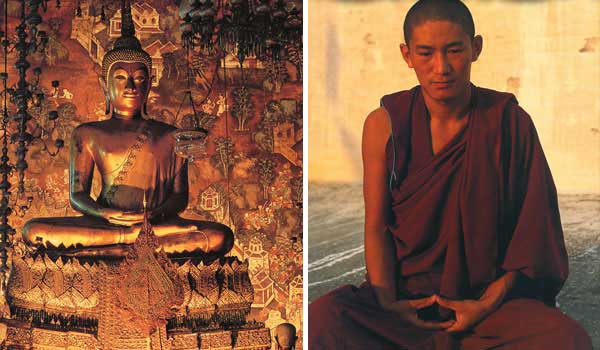
Above: Buddhist literature proposes meditation as the best way to attain a sense of wellbeing and avoid daily anxieties. But this is a great deception. Those who meditate to push concerns out of their minds come face to face with the same worries when their meditation ends. Trying to forget worries may afford temporary relief, but does not remove them; temporary tranquilization of the brain is of no use. The only way to true well-being and happiness is submit to the fate that the One and Only and True God has decreed. The believer who knows that no single leaf falls apart from the will of God, knows too that everything that happens to him is a test. Throughout his lifetime, a person is tested by everything he experiences and by every deed he does. And in the life to come, he will receive the most just reward for them.
Left: A statue of Buddha in the Wat Po Temple in Bangkok.
Believers who fear God's punishment, serve only Him, obey His commands absolutely, avoid evil and act in ways that will win our Lord's pleasure. To be attached to God with strong bonds of love, fearing Him and heeding His commands and being determined to serve Him—that is the only way to gain moral superiority that a person should commit to. He would never compromise that goal, even if it conflicts with his interests. He may have a few fine moral qualities otherwise, but these will be restricted, short-lived or depend on some condition.
Buddhism also recommends good deeds, of course, but they may have no value in the sight of God. What value lies in a person's doing some good to those around him, if he is ungrateful to God, denying the existence of the One Who created him from nothing? In order for his deeds to have any value, they must be done with faith in God—with a view to gaining His approval, in awe of His glory, obedience, and with awareness of His power. For this reason, believers' superior moral character does not rest on romanticism. Their worship is continual and uninterrupted, as God has commanded in the Qur'an:
God augments those who are guided by giving them greater guidance. In your Lord's sight, right actions that are lasting are better both in reward and end result. (Qur'an, 19: 76)

Today, mystical movements such as meditation and yoga are very popular in the West. But the true path to inner peace, happiness and a good conscience is not found in such transient tranquilizations of the brain; it comes from believing in God, submitting to Him with a faithful heart, and leading one's life in a way that will please Him.
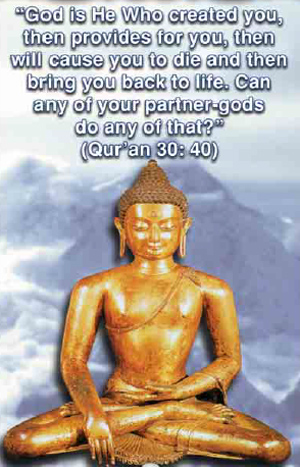

Everything in the heavens and earth belongs to Him, and the religion belongs to Him, firmly and for ever. So why do you fear anyone other than God? (Qur'an, 16: 52)
Wealth and sons are the embellishment of the life of this world. But, in your Lord's sight, right actions that are lasting bring a better reward and are a better basis for hope. (Qur'an, 18: 46)
"The call of truth is made to Him alone. Those they call upon apart from Him do not respond to them at all." (Qur'an 13: 14)
"If My servants ask you abount Me, I am near. I answer the call of the caller when he call on Me." (Qur'an 2: 186)

Around Buddhist temples, you can see hundreds of prayer flags attached to ropes. According to this superstition, prayers written on these flags are more likely to be fulfilled if carried by the wind. Like other Buddhist ideas, this too is a myth. Denying the existence of God, Buddhists are at a loss to explain to whom they are praying or why. In the Qur'an, God reminds us that only prayers addressed to our Lord, the One and Only God, will be accepted.

People must be wary of growing attached to transient and deceptive baubles in this life, because life in this world is very short. Wealth, beauty and worldly possessions are worthless in the afterlife. The buried body will decay; time will destroy material possessions. Everyone will be brought into the presence of God to give an account. Moreover, if you ask a thirty-year-old what he has experienced up to this point, he'll say that his life has passed by very quickly. He may live another thirty or fifty years in the same way, before his life will come to an end.
"Some people set up equals to God, loving them as they should love God." (Qur'an 2: 165)
"Luqman said, 'My son, do not associate anything with God. Associating others with Him is a terrible wrong.' " (Qur'an 31: 13)

a)Buddhists meticulously practice the traditions inherited from their ancestors; they spend days saying prayers in the precincts of their temple and spinning prayer wheels. But in seeing these practices as a way of salvation, Buddhists are greatly deceived. Statues of wood and stone that they bow before, burn incense to and pray to cannot hear their entreaties or answer their prayers.
b)Strange ceremonies performed in places dedicated to the name of Buddha demonstrate the perversity of Buddhist beliefs. In these pagan ceremonies, stone statues of Buddha are worshipped, even though they have no power to do either good or harm. It is irrational to expect assistance from these statues, but those brainwashed by Buddhist teachings reach the point where they cannot recognize plain nonsense.
c) Buddhism's beliefs and ceremonies make people spiritually ill, with no regard for science, technology, art, esthetics or civilization in general.
They are greatly deceived in their belief that they are worshipping by burning candles.
d)According to Buddhist rituals, the beads pictured here are holy. Buddhists repeat their prayers to Buddha millions of times (they will never gain anything by these prayers). This community, having forgotten God, expects help from a powerless servant whom He created, and is leading itself into great anguish if it does do not give up their perverse beliefs.
e) Buddhist priests must conform to very different rules from those that ordinary Buddhists follow. After the noon meal, they cannot eat anything until the next day, and must meditate every night without interruption. These strange customs have no place in true religion. But God always commands what is easy for His servants; in the Qur'an He says:"As for him who gives out and guards against evil and confirms the good, We will pave his way to ease." (Qur'an, 92: 5-7)
f)Buddhists perform strange rituals in front of statues of Buddha. Here, one of these is prostrating themselves on the ground in a gesture of respect. The first thing they do after entering a temple is to bow before the statue of Buddha and touch their faces to the floor Islam rejects the perverse beliefs of pagan communities and commands everyone to serve our Lord, the Compassionate and the Merciful, the only Master of the universe. In the Qur'an, God says, "So glorify your Lord with praise and be one of the prostrators. And worship your Lord until what is Certain comes to you."(Qur'an, 15: 98-99)
g)A trumpet 4.5 meters in length called the radong is very important in Buddhist rituals and is used during their ceremonies. Buddhism has devolved into a religion of ceremonies, rites and rituals that cause people great loss, both in this life or the world to come.

"The kingdom of the heavens and earth belongs to God and, on the Day that the Hour arrives, that Day the liars will be lost." (Qur'an 45: 27)
In several verses, God draws our attention to the fact that the span of life in this world is short; He informs us that in the afterlife, people will openly confess this:
On the day We gather them together—when it will seem if they had tarried no more than an hour of a single day… (Qur'an, 10: 45)
On the Day the Last Hour arrives, the evildoers will swear they have not even tarried for an hour. That is the extent to which they are deceived. (Qur'an, 30: 55)
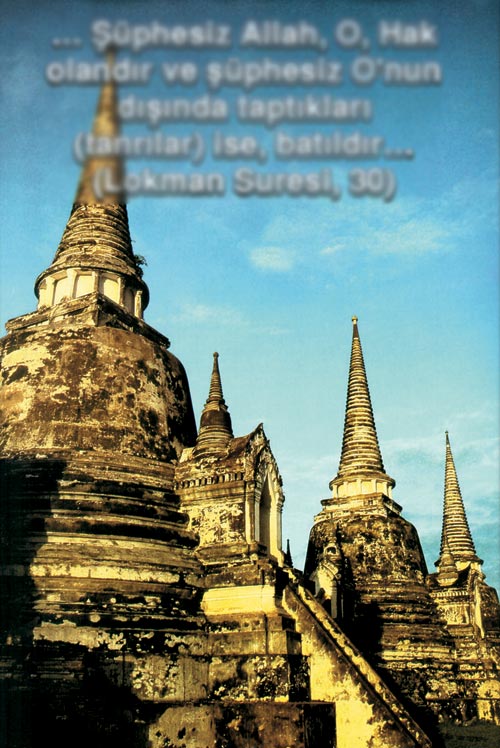

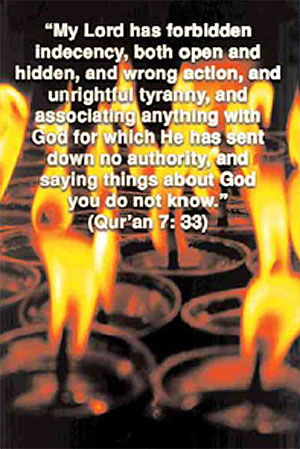
a)Though Buddhism has thousands of rules and ceremonies, none is founded on any belief in the everlasting afterlife, thus causing great spiritual damage to those caught up in its perversity. Along with superstitions, the unjust practices of Buddhists indicate their lack of sincerity. Where Buddhism is widespread, many suffer from great poverty, but no expense is spared in constructing pagan temples dedicated to Buddha. Rejection of the truth of the afterlife leads Buddhists into moral and spiritual ruin, cutting them off from the external world, giving them no concern for justice or regard for others. Those with such a dark and gloomy outlook cannot find or implement intelligent solutions to society's problems.
b) In some quarters, Buddhism is seen as a path of high morality, mutual support and self-sacrifice. But the fact that people are living in destitution in Buddhist countries like Nepal, Tibet and Cambodia shows clearly that this mutual support and self-sacrifice is not a reality.
c-d)Nepal is one country where Buddhism is strongest, but the Nepalese people are very poor. In the region of Mustang on the slopes of the Himalayas, people live in dingy houses made of mud.

It will be very unwise for a person to be deceived by the transient attractions of this short earthly life and to pay no regard to the afterlife. The day when people will have their account to God is a reality. In the Qur'an (10: 7-8), God commands:
As for those who do not expect to meet Us and are content with the life of this world and at rest in it, and those who are heedless of Our Signs, their shelter will be the Fire because of what they earned.
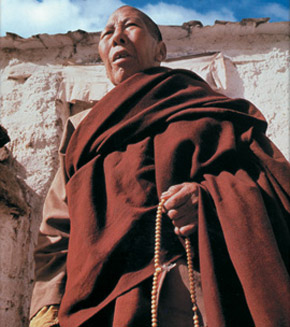

"God is the Real, and what you call on apart from Him is false. God is the All-High, the Most Great." (Qur'an 22: 62)
"They said, 'We found fathers worshipping them. 'He [Ibrahim] said, 'You and your fathers are clearly misguided.' " (Qur'an 21: 53-54)
But to those who are not fooled by the life of this world and choose the endless life of the world to come, God announces good news:
If anyone desires to cultivate the hereafter, We will increase him in his cultivation. If anyone desires to cultivate this world, We will give him some of it but he will have no share in the hereafter. (Qur'an, 42: 20)
Do not direct your eyes longingly to what We have given certain of them to enjoy, the flower of the life of this world, so that We can test them by it. Your Lord's provision is better and longer lasting. (Qur'an, 20: 131)
"They worship, instead of God, what can nelther harm them nor help them, saying, 'These are our intercessors with God.' " (Qur'an 10: 18)
"Some people set up equals to God, loving them as they should love God." (Qur'an 2: 165)
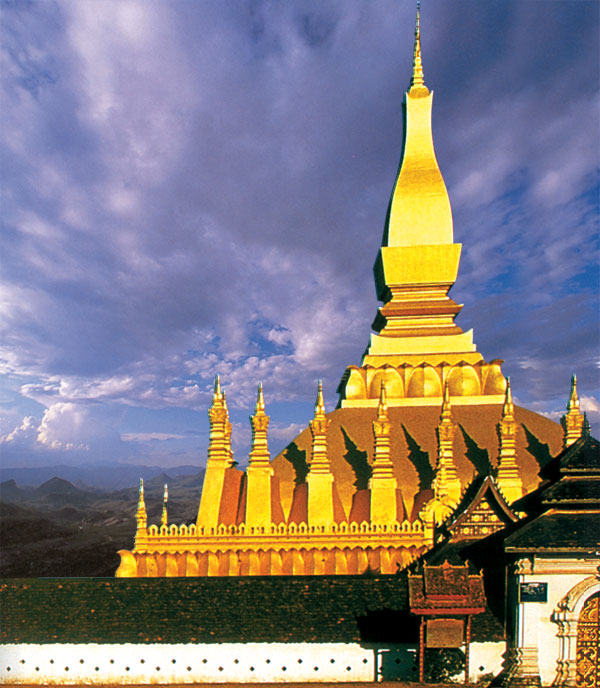
NOTES
3. Buddhism, The Catholic Encyclopedia, vol. 3, Copyright © 1908 by Robert Appleton Company Online Edition Copyright © 1999 by Kevin Knight, http://www.newadvent.org 
4. Edward Washburn Hopkins, The Religions of India, Ginn & Company, pp. 319-320 
5. Dr. Ali Ihsan Yitik, Hint Kokenli Dinlerde Karma Inancının Tenasuh Inancıyla Iliskisi (The Relation of the Idea of Karma in Indian Religions with the Idea of Reincarnation) , pp. 130-131 
